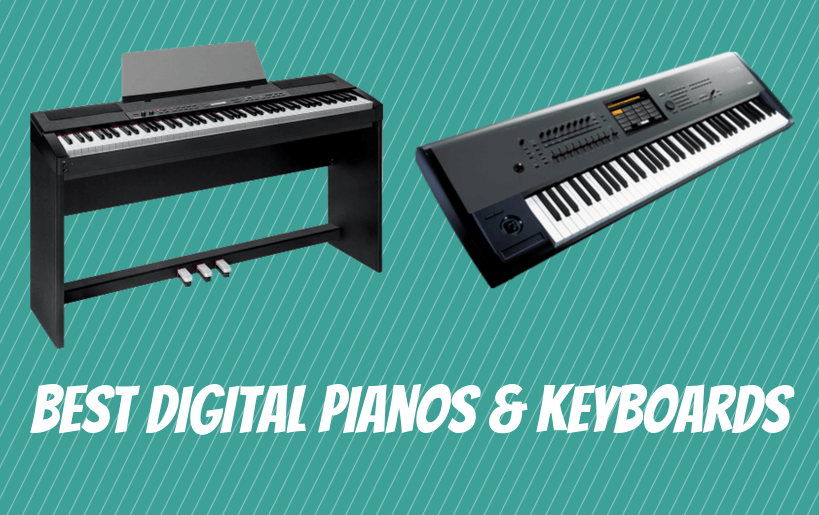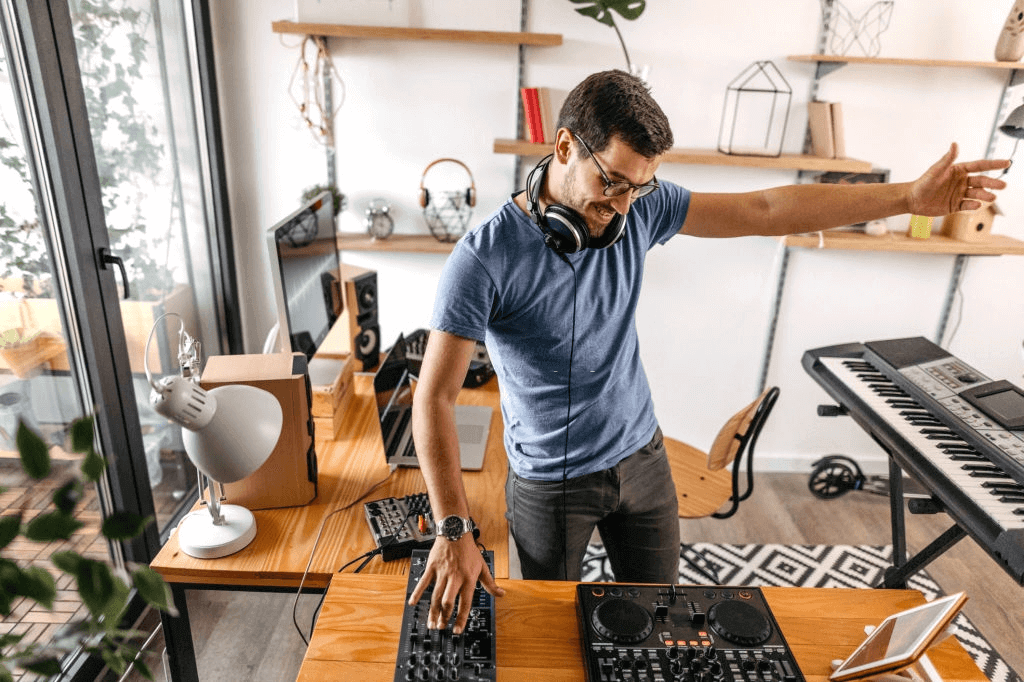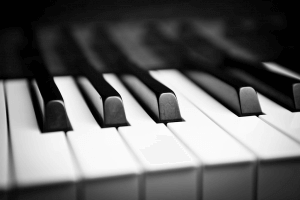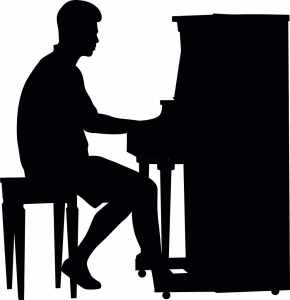Whether you are just at the beginning of your musical journey, or a skillful and experienced pianist, I’m sure you’ll agree that choosing the perfect piano or keyboard is not as easy as it might seem. An important thing to remember is that there is no such thing as the best or perfect instrument – each and one of us needs something else and will be happy with a different choice.

Keeping that in mind, I picked 10 interesting and worth checking digital pianos and keyboards, which might help you in selecting the best digital piano as per your needs.
Table could not be displayed.Quick Navigation
Top 10 Best Digital Pianos & Keyboards 2022
1. Yamaha YDP-184 – Best Overall Piano
For my first pick in this best digital piano list, I decided to choose the Yamaha YDP-184 – a popular piano from the Arius series. This model has a high level of realism and will be a perfect fit for classic piano players looking for a non-portable option to play at home.
The piano uses Pure CF Sound Engine technology, i.e. the sound of the best concert grand pianos! It allows you to choose from 10 different tones and 128 polyphony voices.
The keyboard has 88 weighted keys with ivory keytops to provide stability & amazing response, thus presenting you with a pure and classic piano feeling. It has four levels of sensitivity adjustment, allowing to experience dynamics truly. The keys have been balanced with precision, resembling the resistance of the hammers of a concert piano.
Thanks to the Reverb (changing the acoustics and echo), Damper Resonance (regulated with the right pedal), and an IAC- Intelligent Acoustic Control (automatically adjusts the sound quality of the instrument according to volume), you can get super-clear audibility of the sounds.
- Great build
- 4 levels of touch sensitivity adjustment
- Based on Pure CF Sound Engine tech
- A fairly heavy and large model
- An advanced instrument requiring experience
2. Roland RP501 – Value For Money
This affordable Roland definitely has style and will allow you to give great performances from the comfort of your home, as well as to learn online thanks to the Roland Piano Every Day App. It will easily fit into your room or apartment, filling the space with a fresh, classy style.
One of the main advantages of this model is its flexibility and connectivity to other devices (via Bluetooth) – which makes it easy to mix, record and save audio files (MIDI and Audio USB, WAV, MP3). This model comes with the 3D ambience Headphones that have a very high sound quality and clarity – you can quickly lose yourself in music and focus on learning.
The PHA-4 Standard keyboard consists of 88 weighted keys with an ivory feel finish. As I mentioned with the previous models, weighted keys are essential for more advanced players and are a great fit if you’re just starting to play, making you adjusted to pressure and proper technique.
- Compatible with Roland Piano Every Day app
- Perfect for home practice and learning
- 88 weighted key set with good sense of pressure and sound quality
- HQ Headset and Bluetooth connectivity
- Might not be sufficient for more advanced players in need of a deep/rich sound
3. Korg LP-380 – Best In A Budget
I think this is one of the best choices if you are looking for a decent keyboard at a low price. This digital piano from Korg caught my attention with its very minimalistic and slick design. Not much might be happening here in terms of displays, speakers and additional functions, but this makes the instrument only 26 cm deep. Its smaller corpus allows it to fit almost anywhere!
Korg LP-380 is equipped with the RH3 keyboard model which you can adjust on three hardness levels, from light, normal to heavy. The keyboard is progressive, i.e. lighter at the top and heavier at the bottom. RH3 is Korgs flagship keyboard, and they did a great job with its natural and smooth touch. To recreate the acoustic piano sound as faithfully as possible, the sound switches between four piano samples depending on your dynamics.
The Korg LP-380 has access to three effects: brilliance – adjusts the brightness of the tone, reverb – simulates the natural reverberation of a concert hall, and chorus – which adds depth and space.
- Small and easy to adjust in limited space.
- Practical and functional, with good sound quality.
- A fair amount of effects and the ability to add layers with different sounds and volume.
- Easy to follow manual and display.
- You won’t find the depth and strong bass as in more professional models
- Speaker situated below the keyboard might not please a more advanced ear and need for wider dynamics.
4. Casio PX-S3000 – Best Portable Digital Piano 2022
Portable, stylish and practical? The new model of the PX-S series offers a rich sound, along with a futuristic look and progressive rhythms. A definite winner if you appreciate a sharp design and need something light and steady.
Its Smart Scaled Hammer Action keyboard provides an authentic playing experience – fully weighted 88 keys, ebony and ivory imitations ensure a comfortable feeling and natural touch. Equipped with a new speaker system and functions such as Bluetooth or connectivity with the Chordana Play for piano app, the PX-S3000 is a good choice if you want to remain versatile.
700 sounds together with 200 rhythms seem more than enough considering the light features of this keyboard and will make it a great starting model to enjoy more than just the classical tunes.
- Portable and light
- Good for learning – Chordana Play for piano app
- Bluetooth connectivity
- Sound system not suitable for larger performances
Read More:
- Top 10 Best Digital Piano Under $500 Reviews
- Top 10 Best Digital Piano Under $1000 Reviews
- Top 10 Best Piano Bench Reviews
5. Yamaha PSR-E473 – Best For Beginners & Students
I think this is one of the best choices if you are looking for a good quality beginners keyboard. Packed with onboard lessons and a song library database – The Yamaha Education System will help you see fast results and enable to perform in front of friends and family in no time! The Yamaha PSR-E473 offers a great start into the world of music learning and playing.
The 61 touch-sensitive key set gives you a minimalized range of a classical piano, allowing you to feel the keys quite well while playing. This Yamaha has many additional functions, giving you a jump start into new genres, sound effects and practice – all of this is just a lot of fun to discover.
Below you’ll find a few pros and cons to narrow down the specifics of the Yamaha PSR-E473 :
- Easy to fit into any room and carry it with you to lessons.
- Great loop pattern maker
- Easy dial in features
- 3 levels + the ability to turn off dynamics.
- Less sequencing features
- Non-weighted keys – not suitable for classical piano players.
6. Kawai ES8 – Best For Musicians
Do you want to buy a digital piano and focus on performing? Do you need to be able to transport your instrument easily? Kawai comes to the rescue with its ES8 Stage Piano.
I think there is no better keys set than the one presented in this model, in this price class. The ES8 keyboard mechanism, RH III Action with Counterweights, is a hammer keyboard with additional key weight. The keys have 3 sound sensors under each one – which will give you full control over the sound and dynamics. The only downside is that they’re not wooden – which would make the ES8 a true pearl in the stage pianos industry.
Important advantages of the ES8 model are its high polyphony (256 voices), numerous recording/playback options (mp3, wave, midi format) alongside with a vast amount of rhythms and accompaniment, making this an excellent fit for live performers. Unfortunately, Kawai did not put too much emphasis on the number of sounds (only 34) and speaker power (2x15W), which could be a bit more powerful in a stage piano.
- Good dynamics control
- Weighted keys with proper cushioning – delicate and precise
- Light and portable
- Perfect for stage performing and transporting
- Could have more no. of sounds (only 34)
- Speaker power could be improved
7. KORG Grandstage – Best For Jazz & Fusion
Another tremendous digital keyboard for the musicians, who likes to keep it simple.
You’ll get a classic, aluminium case piano with plastic inserts kept in dark colors. The panel has been designed in a very transparent manner giving quick access to the most important elements. This includes access to the main tone and an additional layers, effects, tone correction and change of dynamics.
Again Korg presents us with its RH3 key set, which is perfect for precise and technical players. You can enjoy a deep and rich sound, with an appropriately weighted sensation under your fingers. A professional yet clear and simple stage piano for experienced performers.
The KORG Grandstage includes two models and ten presets. The set of sounds of electric pianos is quite impressive – you’ll find all the best-known representatives of the genre, including presets with effects of Tremolo, Chorus and Phaser.
- Stage and performance piano
- Three organ sound engines
- Rich and authentic sound
- Easy-to-use live control features
- Heavy (44lbs)
8. Roland RD-2000 – Best For Studio & Live Performance
If you’re planning to perform on stage and record in a studio, you will definitely need a vast amount of sounds and effects with the ability to adjust them professionally. One of the best pianos worth looking into would be the Roland RD-2000 Stage Piano.
It comes with a 88 key PHA-50 Keyboard with Ivory layering, giving you a great touch and command of the keys. But the best thing of this particular model would be the variety of effects and possibility of adjustments, making it easier than ever to produce and perform in many music styles on stage, or at the studio.
One of the most important features for studio purpose would be its built-in studio-grade 24-bit/192kHz audio interface, making it easy and fast to manage DAW Software through USB. In short terms, you would be able to record MIDI and audio with fantastic quality almost anywhere.
- Amazing sound quality and clearance
- Exquisit customisability
- Perfect for live and studio performance
- Light aluminium body
- The layout and panel might be overwhelming and difficult to get used to
- Small screen
- A lot of adjustments on little space
9. Yamaha P515 – Best Sound & Design
This latest piano from the house of Yamaha is equipped with two powerful piano samples: Yamaha CFX and Bösendorfer Imperial. This combination will be highly acknowledged by more professional players looking for a deep sound and timber. As for the design, this is a real beauty amongst digital pianos.
This NWX – Natural Wood X keyboard has a perfectly balanced cushioning of the keys – that is, they do not bounce too much when pressed and feel very stable. The depth of sound is greater than in its prior models, and will surely gain your liking with its clear, intense bass!
The only thing which might make you question this piano would be its possibilities of dynamic differentiation – it could have been more diversified and wide. Besides that, thrills and staccatos come out great, thanks to the keys natural wooden weight. Playing this instrument will surely steal your heart.
- NWX keyboard mechanism – precision and sensitivity
- Deep and rich sound
- Polyphony: 256 voices
- High-quality sound system
- Quite heavy and wide
- Could have been more dynamically differentiated
10. Korg Pa4X – Best For Music Production
It’s time for Korgs’ new flagship professional arranger and keyboard – explicitly made for the most demanding and experienced performers.
It offers a new type of synthesis – EDS-X (Enhanced Definition Synthesis – Expanded) with 128-voice polyphony, developed especially for Pa4X. Combined with DNC (Defined Nuance Control) technology, it will give you an incredibly faithful and authentic sound of a grand piano, alongside with the simplicity of recreating various articulation and sound extraction techniques on the spot.
Also, the manufacturer provides 400 MB FlashRAM memory for user samples and sounds, including drum samples and vocal tracks! Samples can be recorded and edited on board of the instrument itself.
Controlled through a touchscreen interface, will allow you to make adjustments faster than ever! Keep in mind that you’ll find more than 500 unique styles and 1500 sounds to choose from – without proper knowledge, you won’t be able to discover Pa4X assets truly.
- Amazing sound quality
- Touchscreen interface
- Onboard recording system
- Perfect for arranging and production
- Variety of effects and modulations
- Very costly
- A lot of options and settings requiring time and practice
These 10 digital pianos and keyboards all have their strong and weak sides, so it’s truly your needs and interests that will determine which type of piano will be the best fit. Hopefully this article will help you find your way, and clear out a bit what is it you’re looking for – and what’s more important – which instrument will be suitable for you. Good luck and enjoy the musical journey!
Best Digital Piano Buying Guide

Digital pianos are here to stay. Despite the fact that they might not look and feel exactly like acoustic pianos, they come with a lot of advantages over them: they are more portable, affordable and you never have to tune them or do any kind of maintenance. In addition to that, digital pianos might include learning features, such as metronomes and backing tracks, while their sound versatility that can go beyond acoustic piano sounds allow you to experiment. These are some of the reasons that people are looking to buy digital pianos. To help you with this quest, I have created the following guide that explains everything you need to take into account before you decide on your new digital piano.
Sound quality
When you are looking for any musical instrument, the sound quality is always the most important thing that you should pay attention to. Sound quality includes a number of factors, such as the quality of the samples that are used in the included voices, as well as the built-in speakers of the keyboard (in case you don’t have an amp). Sound quality is often tied to the price range of a digital piano: the more you pay, the better the sound. However, there are very decent options even for those on a low budget, so I would advise you to try out some of the models that are available depending on your budget and trust your ears regarding sound quality.
Keys

Digital pianos in general come equipped with 88 keys, that allow them to replicate the full frequency range of an acoustic piano. This is their most important distinction from keyboards, and it is something that is necessary and you should pay attention to. Moreover, there are many options regarding the weight of the keys: fully-weighted keys are those that come closer to the feel of an acoustic piano, but are usually found in more expensive models. Some digital pianos come with semi-weighted keys and there are also those that come with non-weighted keys. I wouldn’t advise you to get a piano with non-weighted keys, unless you want to purchase it for a child.
Included voices
Most digital pianos are really good at replicating the sounds of an acoustic piano by sampling it. In addition to that, many models feature even more voices that let the digital piano replicate other instruments such as organ and string instruments. It is interesting that sometimes more expensive digital pianos feature a smaller variety of included voices, concentrating on the accurate reproduction of acoustic piano sound. Depending on what you want to do with your piano, you should definitely check if the included voices satisfy your needs or not.
Built-in speakers
Most keyboards come with some kind of built-in speakers in order to allow you to hear what you play. Those speakers are not always high-quality and that depends a lot on the price. The best but also the most expensive solution is to get a keyboard amp, if you don’t have one lying around. If you don’t plan to get an amp, I would advise you to try the digital piano you intend to buy, in order to check whether you are happy with its built-in speakers. Most keyboards also come with an input for headphones (and some include a pair of headphones in the package) to allow you to play without disturbing others.
Portability
Portability is not important for everyone: if you intend to keep your digital piano at home, you had better skip this and move to the next feature. On the other side, if you want to carry your digital piano around, you should prepare for that by purchasing a lightweight and compact piano. You will certainly need a case for that, and depending on how and how far you plan to move your piano, you should get either a soft case or a more expensive hard one.
MIDI compatibility
This is quite an advanced feature if you are looking for your first piano, however, it might be useful for you in the future. Digital pianos that come with MIDI compatibility can be connected to your computer and, by using digital audio workstations or other audio programs, they allow you to use many sound libraries as well as compose digitally. If you only want to play classical piano, then this feature is not important for you and you don’t need to take it into consideration for buying a digital piano.
Extra accessories

If you are planning to buy your first digital piano, you should take into account some extra accessories that are essential. Those include a stand, a bench and a footswitch. Depending on your needs, you might want to purchase a case for your piano or a pair of headphones. Now, some of the models come equipped with certain accessories, while others come with nothing at all. Always pay attention to the accessories that you need, as they might increase the budget significantly.
Other features
There are some included features that might or not be important for you. For example, there are certain models that come with built-in backing tracks, letting you improvise on them. Moreover, many digital pianos feature a recording ability that allows you to record and play back your performances. If these features are a must for you, you should look for models that incorporate them.
As you have already realized, there are a number of features that you should take into consideration before buying a new digital piano. Of course, your budget will greatly determine your final choice, but you should keep in mind that a digital piano is not something that you will probably change in a few years, so a bigger investment is usually worth it. Fortunately, there are many options available for those on a low budget and in general, digital pianos don’t even come close to the cost of an acoustic piano. I hope that this guide has helped you choose your new digital piano and that you will start playing soon!